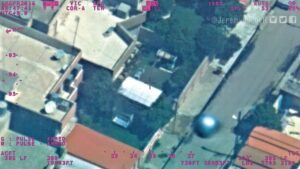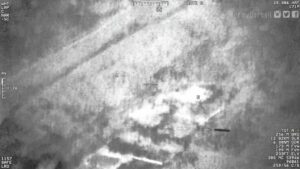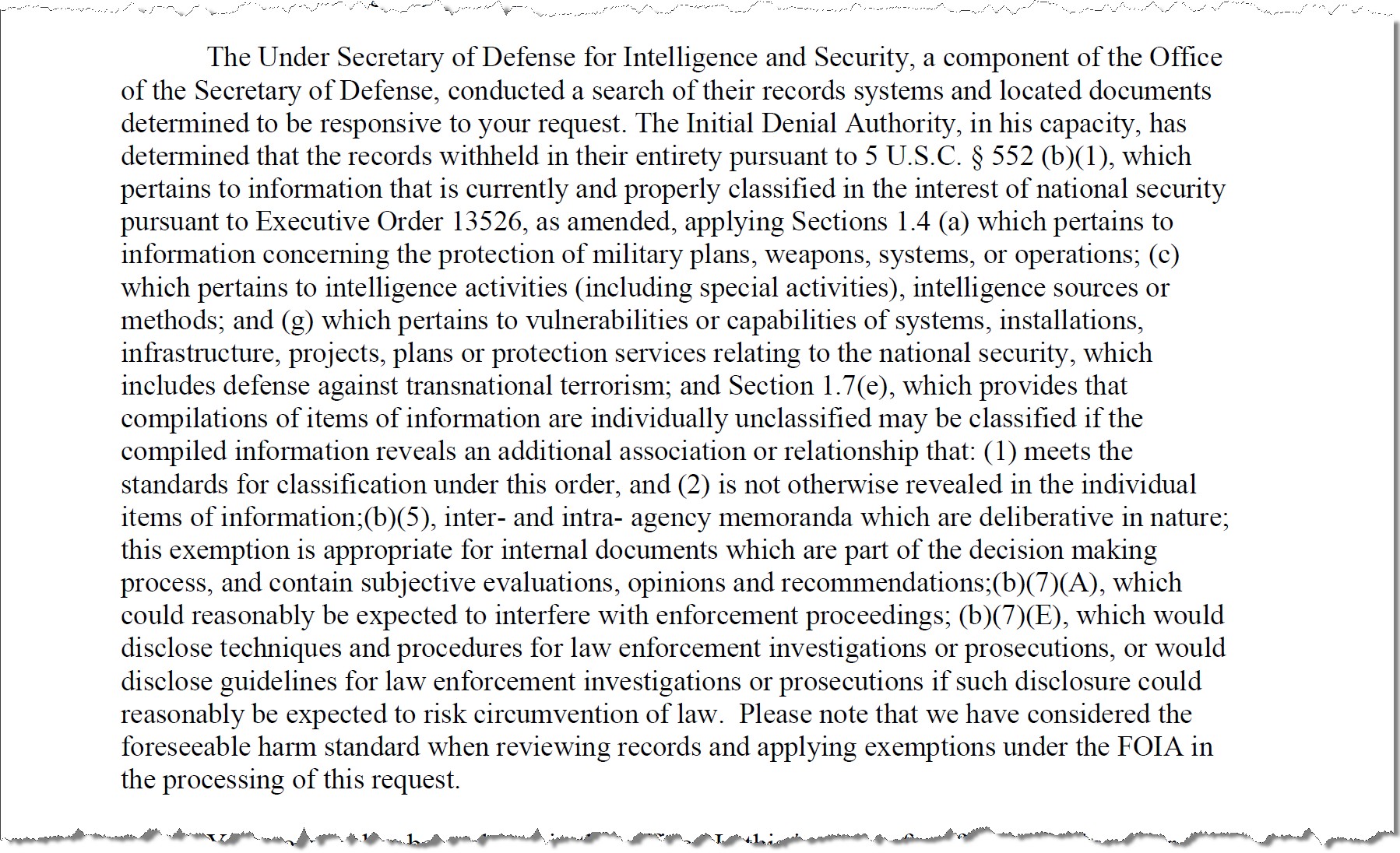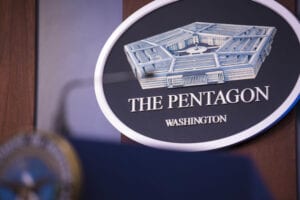- The Department of Defense (DoD) cites national security and law enforcement proceeding reasons not to release any “Mosul Orb” details
- The DoD invokes a new approach to withhold information, using FOIA Exemptions (b)(7)(A) and (b)(7)(E), typically reserved for law enforcement investigations, but now associates that with UAP cases
- This change in tactics could signify a shift in how the government handles future UAP information disclosures.

The Pentagon has maintained its silence on the leaked image of the so-called “Mosul Orb” depicting an alleged Unidentified Aerial [Anomalous] Phenomena or UAP seen over an active conflict zone in Iraq back in 2016. The case has been left unaddressed and unconfirmed by the Department of Defense (DoD) since the image and case details first appeared online in January 2023, despite the significant public interest UAP have generated, and the fact that the Pentagon has previously offered commentary on past leaks related to the same. The Pentagon would only say that, “We’re not going to comment on remarks by unnamed sources alleging leaks from a classified report,” in a statement received about the “Mosul Orb” by The Black Vault in January.
The “Mosul Orb”, obtained and released by investigative journalists Jeremy Corbell and George Knapp, shows what has been alleged as a UAP, captured by an MC-12, medium-to-low altitude, twin-engine turboprop aircraft over Mosul, Iraq, on April 16, 2016.
However, a new response to a Freedom of Information Act (FOIA) request filed by The Black Vault (23-F-0389), may indicate the classified and sensitive nature of the “Mosul Orb” case, which sheds light on why the Pentagon refused to comment. The DoD states in a FOIA denial letter received today by The Black Vault, that information relating to the case is “classified,” and it also relates to an ongoing “law enforcement investigation.”
The refusal was justified under multiple sections of the FOIA, including ones related to national security, intelligence activities, and law enforcement proceedings, among others. “The Initial Denial Authority, in his capacity, has determined that the records withheld in their entirety pursuant to 5 U.S.C. § 552 (b)(1), which pertains to information that is currently and properly classified in the interest of national security pursuant to Executive Order 13526…” the denial letter stated.
This decision, coupled with the Pentagon’s silence on the matter, adds another layer to the ongoing secrecy surrounding UAP-related information.
The classified nature of the “Mosul Orb” UAP and the lack of commentary from the Pentagon may further suggest an active investigation into the leaks. The “Mosul Orb” is only one of multiple cases published by Corbell and Knapp, that may compromise classified information.

Another leak published by Corbell and Knapp in March 2023, dubbed the “Baghdad Phantom“, may also encroach into classified territory. Although FOIA requests are still outstanding about this specific case, the footage originally shot of a “cylindrical” shaped UAP, and released in the form of six still frame images, is likely classified. The footage was captured by an MQ-9 “Reaper” drone, and according to the Air Combat Command (ACC) when speaking to The Black Vault, all footage captured by that platform is inherently classified.
“In accordance with general operational security practices and the MQ-9 Security Classification guide, all imagery captured by the MQ-9 is typically classified unless mission requirements dictate the need to sanitize any video footage for lower classification or public release purposes,” the emailed statement said. “The MQ-9 Security Classification guide and the details within is not releasable or available to the public in accordance with its own level of security classification.”
The Black Vault further pressed for the classification level of the footage, but that would not be answered by the ACC as they stated, “Per the MQ-9’s SCG, we are unable to provide additional clarity into what kind of level of classification video footage is by default other what was mentioned previously.” ACC further stated, “Air Combat Command is unable to verify the validity of the [Baghdad Phantom imagery]… but U.S. Central Command [CENTCOM] may be a better point of contact.” When The Black Vault contacted CENTCOM for comment, they stated, “We have nothing for you on this.”
These types of responses indicate the recent leaks of both the “Baghdad Phantom” and the “Mosul Orb” are classified in nature, and that an investigation was, is, or will be, underway given the reaction by the DoD to other recent classified leaks.
The Black Vault has asked the Pentagon about investigation(s) into the leaks referenced above on UAP related imagery, yet the request for comment, and all subsequent follow-ups, have been ignored.
One other aspect of the “Mosul Orb” denial letter was the use of an exemption yet to be seen in UAP related requests to the DoD: (b)(7).
The use of Exemptions (b)(7)(A) and (b)(7)(E) by the DoD in response to a FOIA request for records related to the “Mosul Orb” highlights the DoD’s growing concern when in comes to their involvement in UAP-related matters. The exemptions point towards an ongoing “law enforcement investigation” and reveal an intent to protect the “techniques” used in such investigations. Is this in relation to the leak of material relating to this case? Does that indicate that investigation(s) is/are ongoing? Or is this a broad-stroke attempt to exempt ALL information relating to UAP and/or AARO, essentially thwarting any effort to get this type of related information via the FOIA? That has yet to be seen. However, two related in subject matter request denials from the DoD came within 60 seconds of the “Mosul Orb” denial, which may further shed light on the tactics now employed by the DoD to withhold all UAP-related documentation and AARO-related material.
These two other cases resulted in the same exact invocation of Exemptions (b)(7)(A) and (b)(7)(E) just like the “Mosul Orb” request, suggesting a pattern of usage that could indicate all UAP-related cases are now considered part of a law enforcement investigation. And that is trouble for anyone who advocates for transparency on this issue. It should be noted that these two cases, contrary to the “Mosul Orb” FOIA case, did not invoke the (b)(1) [classified information]exemption cited in their letter.
One of the two cases was a request for, “…all emails and letters exchanged between any members of the AARO and the UAPx organization,” while the other sought “… all records pertaining to the interviews of Dr. Robert Jacobs and Robert Salas.” There are numerous other requests filed by The Black Vault relating to communcations between AARO and other organizations along with case files seeking out other interviews conducted by AARO with other individuals. So it stressed that the UAPx, Robert Jacobs and Robert Salas cases are not considered the only filed and The Black Vault was targeting just them. Rather, numerous other organizations and individuals are named within FOIA cases still outstanding. To further that point, they likely, with time, will suffer the same fate and result in the same final response given the above.
The use of Exemptions (b)(7)(A) and (b)(7)(E) by the DoD in response to FOIA requests such as these may indicate that the DoD now considers AARO, and their investigation into UAP, as an ongoing law enforcement investigation into these phenomena. And if so, and this is speculatory as of the writing of this article, that may mean that any AARO/UAP/UFO or any related acronym or keyword related request is met with the same result. All information relating to the aforementioned may just simply be lumped in to AARO’s efforts, and considered a “law enforcement investigation”, thus exempting 100% of anything relating to AARO, UAP or any related acronym a FOIA requester wants to fill in — classified or not.
These FOIA cases by The Black Vault shed light on the continuing struggle for transparency when it comes to UAP investigations. It highlights the tension between public interest, potential national security concerns, and the ongoing mysteries surrounding these phenomena that have been documented for decades.
Despite the Pentagon’s silence on the “Mosul Orb” case and the UAP issue as a whole, the quest for transparency in UAP investigations remains. The conversation is far from over, as The Black Vault continues to probe and question the nature of these unexplained phenomena and the role of our government in investigating and communicating about them. It remains to be seen how this saga will unfold, but one thing is clear: the call for transparency will continue to grow louder. Or at least, it should.
###
Document Archive
“Mosul Orb” Denial Letter
UAPx Communications Denial Letter
AARO Interview of Robert Jacobs and Robert Salas Communications Denial Letter
Follow The Black Vault on Social Media:

